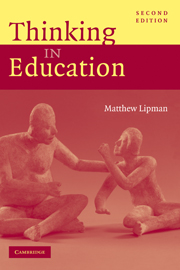Book contents
- Frontmatter
- Contents
- Preface
- Introduction to the Second Edition
- PART ONE EDUCATION FOR THINKING
- PART TWO COMMUNITIES OF INQUIRY
- PART THREE ORCHESTRATING THE COMPONENTS
- PART FOUR EDUCATION FOR THE IMPROVEMENT OF THINKING
- 9 The Transactive Dimensions of Thinking
- 10 Education for Critical Thinking
- 11 Education for Creative Thinking
- 12 Education for Caring Thinking
- 13 Strengthening the Power of Judgment
- Bibliography
- Index
10 - Education for Critical Thinking
Published online by Cambridge University Press: 05 June 2012
- Frontmatter
- Contents
- Preface
- Introduction to the Second Edition
- PART ONE EDUCATION FOR THINKING
- PART TWO COMMUNITIES OF INQUIRY
- PART THREE ORCHESTRATING THE COMPONENTS
- PART FOUR EDUCATION FOR THE IMPROVEMENT OF THINKING
- 9 The Transactive Dimensions of Thinking
- 10 Education for Critical Thinking
- 11 Education for Creative Thinking
- 12 Education for Caring Thinking
- 13 Strengthening the Power of Judgment
- Bibliography
- Index
Summary
CRITICAL THINKING: WHAT IT CAN BE
Outstanding among the intellectual virtues treasured in the ancient world were knowledge and wisdom. Knowledge was needed for cases in which the required decisions could be made by rational means, such as the relationship between cause and effect or between means and end. But wisdom was necessary for cases that were rationally undecidable and where what had to be relied on instead were Solomonic judgments.
In highly stable, tradition-bound societies, knowledge was often conceived of as a stockpile of truths transmitted from the older to the younger generations. It was thought of as a body of eternal verities, perennially applicable to an unchanging world. In times of change, however, traditional knowledge was likely to become inapplicable or obsolete. What was emphasized instead were intellectual flexibility and resourcefulness. Wisdom was cultivated, by the Stoics and others, in preparation for whatever might happen, whether for good or for ill.
We no longer divide things up the way the ancients did. With modern experimental science, the mountains of knowledge accumulated in the past are no longer looked upon with awe. And the notion of wisdom seems more remote than ever.
On the other hand, we are ready to acknowledge that past experience is not always a reliable guide to the future, with the result that judgments of probability must be made.
- Type
- Chapter
- Information
- Thinking in Education , pp. 205 - 242Publisher: Cambridge University PressPrint publication year: 2003



